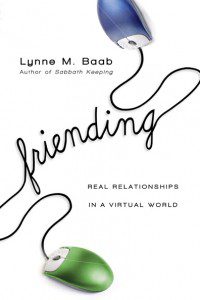 I’ve been a fan of Lynne Baab‘s writing since I read her book on fasting a few years ago. I draw from it in the fasting chapter of Flunking Sainthood and highly recommend it. Now, I also have the pleasure of working with her as an editor! She’s working on a book for WJK on how congregations can undertake spiritual practices together.
I’ve been a fan of Lynne Baab‘s writing since I read her book on fasting a few years ago. I draw from it in the fasting chapter of Flunking Sainthood and highly recommend it. Now, I also have the pleasure of working with her as an editor! She’s working on a book for WJK on how congregations can undertake spiritual practices together.
And in the meantime, this busy author has yet another book out, this one with IVP. Friending: Real Relationships in a Virtual World discusses friendship in the light of new ways of staying in touch with friends. She draws on 1 Corinthians 13 and Colossians 3 to explore the ways friends today show love to each other. –JKR
Why did you want to write a book on friendship?
I’ve been thinking about how friendships work since I was 7 or 8 years old. My family moved 11 times in my first 15 years, and my mom, my brother and I have talked a lot about friendship skills and issues. My friendships are a place where I have grow spiritually in so many ways, so I have come to see friendship as a spiritual practice, where I live out my Christian faith and values. One additional factor is that I completed a PhD in communication in 2007, with a focus on congregational websites, so I have a particular interest in new media and have been following all the controversy about social networking. All of these areas of pondering come together in my new book.
What was your biggest fear in writing it?
I have two fears. One is that analyzing my own friendships will somehow damage them. My friends have been one of the most precious aspects of my life, and I would never want to hurt them as individuals or hurt our relationships in any way. Yet, I felt called to write the book, so I’m hoping and praying my friends will feel good about the way I have written about friendship.
My second fear relates to all the passionate opinions about social networking and the online world. I am a peaceable person, more comfortable with being encouraging than with being prophetic. I wanted to write a book that would encourage people to try to express love more deeply and richly in their friendships and with potential friends. Because I speak positively in many cases about the role of electronic communication in friendships, I’m afraid that some people will simply write off my ideas.
So you are basically positive about social networking and other forms of online communication?
Human beings were created in the image of a relational God, and we will do just about anything to be in relationship. I heard so many stories about the ways Facebook, Skype, instant messaging and cell phones have helped people stay connected with friends across miles and in the midst of busy schedules. I heard so many stories about the way people are trying to express love to their friends and family members in whatever way they can, including using electronic communication. I want to affirm those choices, while also acknowledging the dangers of overuse and addiction.
I refuse to see electronic communication in black and white terms. That’s the biggest weakness of so much of the media hype around social networking. No form of communication is all good or all bad. I did some reading about the history of the telephone. In the 1920s, when the telephone was starting to become common in homes and people were increasingly using it for chatting as well as doing tasks, Christian leaders sounded an alarm that the telephone would change social patterns in undesirable ways.
When I look at the role of the telephone in my life, it has been largely helpful and occasionally irritating. Others might see a different ratio there than I do, and the comparison doesn’t entirely work because the telephone doesn’t raise as many issues as electronic communication does. The internet can be addictive, foster impersonal interactions and encourage a consumeristic approach to the details of other people’s lives. These have to be addressed, while also affirming the positive contributions and without becoming alarmist.
 In what ways can friendship be a spiritual practice in our time?
In what ways can friendship be a spiritual practice in our time?
Friendship involves a series of choices, and when we try to honor God with our habitual choices, we are engaging in spiritual practices. In our friendships, we live out our values and priorities, and when we try to honor God with our values and priorities, we are engaging in spiritual practices.
What might it look like to honor God with our choices, values and priorities in friendships today? It will vary greatly, and the actual actions may look no different from the actions of someone who does not view their friendship actions as spiritual practices. Because we are trying to honor God in our friendships, we may choose to go off Facebook for a season, in order to spend more time with close-by friends. Or, on an evening when we feel tired, we might choose to set aside a relaxing novel and log onto Facebook to catch up with a few friends who are in the midst of big events. We know their photos and status updates will help us feel connected and give us a way to express support. We may choose to follow a friend’s blog because that’s the best way to access what that friend is thinking, feeling or doing.
One particular practice will frequently appear when we are trying to view our friendships as a spiritual practice. We will slow down. We slow down enough to listen in person, and we will slow down when we access information about friends online. We will pay attention to their lives. We will pray for them. And that takes time.
Are you generally optimistic or pessimistic about friendship practices these days?
The interviews for my book were incredibly encouraging. I heard from people in every age group who make conscious choices to show support to their friends in multiple ways. They try hard to love their friends, using whatever means are at hand. I came away from most of my interviews awed and encouraged.
However, the challenges of busy schedules and mobility are very real, and I heard from people who feel lonely because of one or both of those factors. Electronic communication is both a friendship challenge and a way to help us stay connected with friends when we’re busy or live far away from them. This interplay of busyness, mobility and the many new ways to communicate will continue to be a topic of discussion for years to come.
Lynne Baab is the author of numerous other books including Sabbath Keeping, Fasting and Reaching Out in a Networked World. She is a Presbyterian minister and teaches pastoral theology in Dunedin, New Zealand. Visit her website at www.lynnebaab.com.

